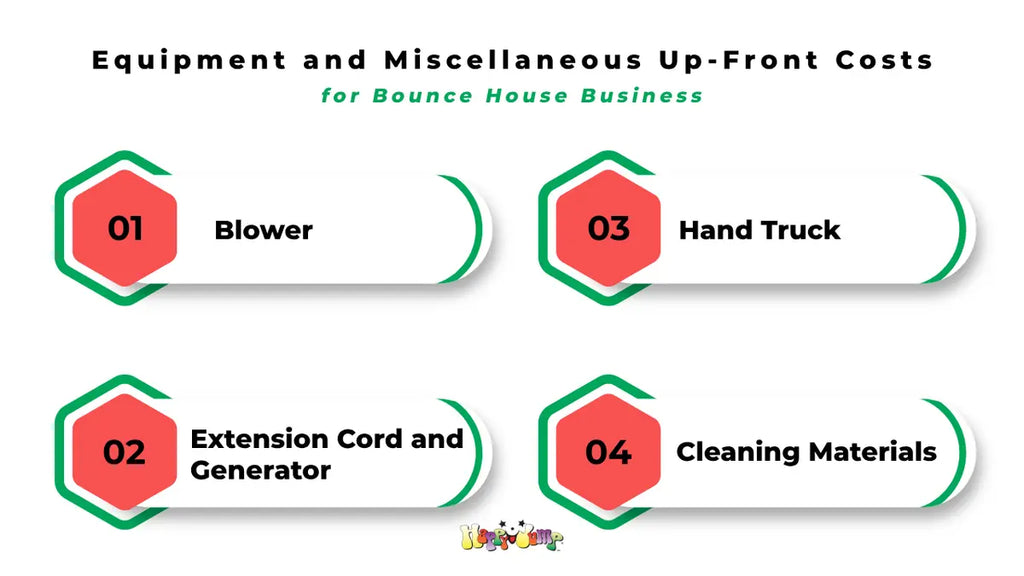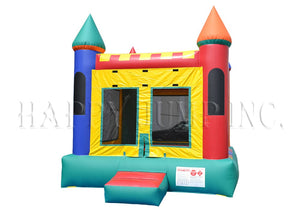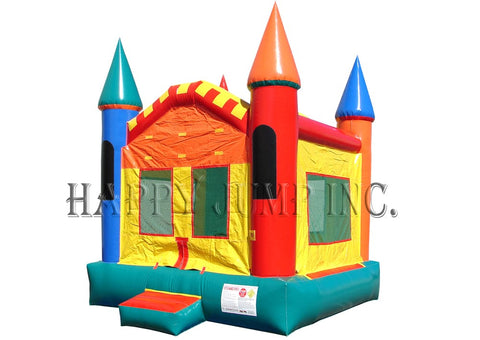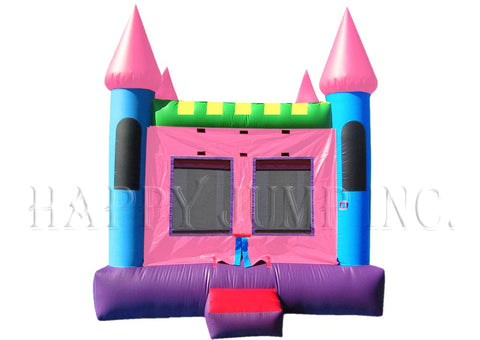
A bounce house business can be an exciting and profitable venture. It involves renting out inflatable bounce houses for events like birthday parties, corporate events, and community gatherings. This guide will walk you through the key steps to start your own bounce house business, covering essential aspects, pros and cons, and necessary insurance details.
Key Points:
- This guide covers essential steps like initial investment, legal aspects, and insurance to get you started.
- Owning a bounce house business offers high demand, scalability, and profitability. However, there's initial investment, storage needs, and physical labor involved.
- General Liability, Product Liability, Commercial Auto, and Workers' Compensation Insurance are crucial to protect your business.
Market Research
Before diving into the bounce house business, conducting thorough market research is essential to assess competition, pricing, and market demand:
- Identify existing bounce house rental businesses in your area through online searches and local directories.
- Determine prevailing rental prices to gauge your profit potential and competitiveness.
- Evaluate competitors' websites and marketing strategies to identify areas where you can differentiate your business and attract customers.
Commercial vs. Residential Bounce Houses
Opting for commercial-grade bounce houses is imperative for ensuring the longevity and reliability of your equipment. Here's why:
- Commercial bounce houses are crafted from sturdier materials, designed to withstand frequent use over an extended period, up to five years.
- Most manufacturers provide better warranties for commercial bounce houses, offering added assurance for your investment.
- While residential bounce houses may seem more economical initially, choosing commercial-grade equipment will ultimately prove more cost-effective in terms of maintenance and replacement expenses.
Selecting Your Bounce House Inventory
In the bounce house business, variety is key. Customers love options, so start by selecting a diverse range of bounce houses to cater to different preferences and events. Consider popular themes like princess castles inflatable, superhero adventures, or tropical paradises. Investing in combo units that feature slides or obstacle courses can add extra appeal.
Finding the Perfect Location
Location plays a crucial role in the success of your bounce house business. Look for areas with high foot traffic, such as parks, community centers, or family-friendly neighborhoods. Ensure your chosen location has sufficient space for setting up and adheres to local zoning regulations.
Setting Up Your Business Structure
Before launching your business, it's essential to decide on its legal structure. Options include sole proprietorship, partnership, or limited liability company (LLC). Consult with legal and financial advisors to determine the best structure for your specific needs, considering factors like liability protection and tax implications.
Expanding Your Services
To stay competitive in the market, consider expanding your services beyond bounce house rentals. Offer additional inflatables such as inflatable slides, water slides, or interactive games. Diversifying your offerings can attract a broader customer base and increase revenue opportunities.
Local Advertising Strategies
Promoting your bounce house business locally necessitates a strategic approach to online and offline marketing:
- Establish a professional website showcasing your offerings, pricing, and booking details, optimized for local search engine visibility.
- Claim and optimize your business profiles on Google My Business, Yelp, and other relevant directories to enhance local search visibility.
- Consider investing in online advertising platforms such as Google AdWords and Facebook ads to target potential customers in your area.
- Network with local organizations, event planners, and businesses to establish partnerships and gain referrals.
Cost Analysis
When considering the financial aspects of launching a bounce house business, it's vital to grasp both the revenue potential and the initial expenses involved. Let's delve into this:
Revenue Estimation
Your potential earnings hinge on factors like the number of bounce houses in your inventory and how frequently you can rent them out. For instance:
- Assuming a rental fee of $85 per bounce house.
- If each bounce house secures 1.5 bookings weekly, that amounts to $127 in weekly revenue per unit.
Let's factor in the cost of acquiring bounce houses:
- Commercial bounce houses typically start at around $1,499 each.
- If you start with three bounce houses, your weekly earnings could exceed $380.
- This setup could lead to paying off each bounce house in just over three months, yielding a profit each week.
It's noteworthy that local market dynamics may vary, potentially impacting your revenue projections.
Additional Equipment and Miscellaneous Up-Front Costs

Aside from acquiring bounce houses, there are several other items and expenses to consider:
- Blower: Essential for inflating the bounce houses.
- Extension Cord and Generator: Necessary for powering the bounce houses in areas lacking convenient power sources.
- Hand Truck: Facilitates the transportation of larger bounce houses.
- Cleaning Materials: Crucial for maintaining hygiene and safety standards.
- Miscellaneous Items: Including sandbags, stakes, cones, duct tape, and other accessories required for setup and maintenance.
- These additional materials play a crucial role in ensuring smooth operations and enhancing the overall professionalism of your business.
Pros and Cons of Owning a Bounce House Business
Pros:
- High Demand: Bounce houses are popular for various events, ensuring a steady stream of potential customers.
- Scalability: You can start small and expand your inventory as your business grows.
- Profitability: With proper management, bounce house rentals can be highly profitable.
- Flexible Schedule: You can operate the business part-time or full-time, depending on your availability.
- Low Overhead: Apart from initial equipment costs, the ongoing expenses are relatively low.
- Fun Business: Working in the entertainment industry can be enjoyable and rewarding.
- Community Engagement: It offers opportunities to engage with your local community.
- Seasonal Peaks: High demand during certain seasons can lead to significant profits.
Cons:
- Initial Investment: The cost of commercial-grade bounce houses and necessary equipment can be high.
- Storage Space: You need ample storage space for the inflatables and equipment.
- Maintenance: Regular cleaning and maintenance are required to keep the bounce houses in good condition.
- Liability: There is a risk of injuries, making insurance essential.
- Weather Dependency: Outdoor events can be affected by bad weather, impacting bookings.
- Physical Labor: Setting up and taking down bounce houses can be physically demanding.
Securing Permits and Insurance
Operating a bounce house business requires obtaining the necessary permits and insurance coverage. Check with your local authorities to understand licensing requirements for inflatable amusement rentals. Additionally, invest in liability insurance to protect your business from potential risks and accidents.
Bounce House Business Insurance
Insurance is crucial for protecting your bounce house business from potential risks. Here are the key aspects to consider:
Types of Insurance:
-
General Liability Insurance:
Covers injuries and property damage that occur during the use of your bounce houses. -
Product Liability Insurance:
Protects against claims related to defects in the inflatables. -
Commercial Auto Insurance:
If you use a vehicle to transport your equipment, this insurance is necessary. -
Worker's Compensation Insurance:
Required if you have employees to cover work-related injuries.
Conclusion
Starting a bounce house business can be a rewarding venture with the right planning and execution. By conducting thorough market research, creating a solid business plan, investing in quality equipment, and securing appropriate insurance, you can set your business up for success. With proper management and marketing, you can enjoy the benefits of owning a fun and profitable business.
Disclaimer
This article is for informational purposes only and does not constitute legal, financial, or business advice. Always consult with a professional advisor before making any business decisions.
FAQs
Why do I need insurance?
Insurance protects your business from financial losses due to accidents, injuries, and lawsuits.
How much does it cost?
The cost varies based on factors like the size of your business, location, and coverage limits.
What does it cover?
It covers liability for injuries, property damage, product defects, and more.
How much does it cost?
The cost varies based on factors like the size of your business, location, and coverage limits.
How to choose a provider?
Compare quotes from multiple insurance providers and choose one that offers comprehensive coverage at a reasonable price.



